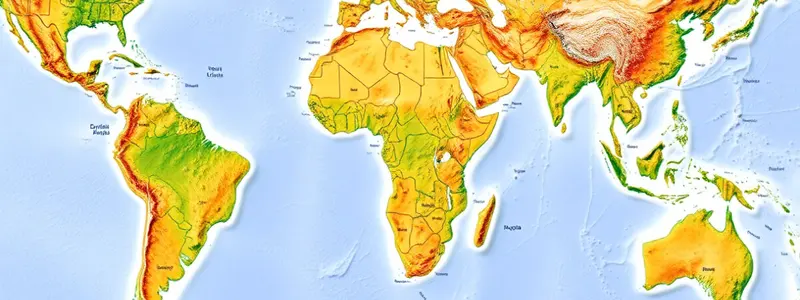Podcast
Questions and Answers
What is the primary focus of fieldwork in geography?
What is the primary focus of fieldwork in geography?
- Direct observation and data collection in the natural environment (correct)
- Direct observation and data collection in a controlled environment
- Statistical analysis of data trends
- Modeling geographic patterns using algorithms
Which of the following is a benefit of understanding geographic patterns and processes?
Which of the following is a benefit of understanding geographic patterns and processes?
- Mapping every individual resource precisely
- Enabling better decision-making (correct)
- Eliminating human impact on the environment
- Guaranteeing sustainable development
Which scale of analysis examines specific patterns and processes across the world?
Which scale of analysis examines specific patterns and processes across the world?
- Comprehensive scale
- Global scale (correct)
- Local scale
- Regional scale
What is a key issue geographic analysis can help address?
What is a key issue geographic analysis can help address?
How does regional scale analysis differ from local scale analysis?
How does regional scale analysis differ from local scale analysis?
What does physical geography primarily focus on?
What does physical geography primarily focus on?
Which branch of geography studies the distribution and interactions of populations?
Which branch of geography studies the distribution and interactions of populations?
Which method is primarily utilized for managing and analyzing spatial data?
Which method is primarily utilized for managing and analyzing spatial data?
What concept in geography describes the unique characteristics of a specific geographical area?
What concept in geography describes the unique characteristics of a specific geographical area?
What does globalization in geography refer to?
What does globalization in geography refer to?
Which field studies the impact of agricultural activities on the land?
Which field studies the impact of agricultural activities on the land?
What is the primary focus of climatology within physical geography?
What is the primary focus of climatology within physical geography?
Which geographic method involves gaining information about the Earth's surface from satellites?
Which geographic method involves gaining information about the Earth's surface from satellites?
Flashcards
Fieldwork
Fieldwork
Direct observation and data collection in the natural environment.
Statistical Analysis
Statistical Analysis
Using statistical methods to understand geographic patterns and trends.
Importance of Geography
Importance of Geography
Understanding spatial patterns and processes to address challenges.
Regional Scale Analysis
Regional Scale Analysis
Signup and view all the flashcards
Local Scale Analysis
Local Scale Analysis
Signup and view all the flashcards
What is Geography?
What is Geography?
Signup and view all the flashcards
Physical Geography
Physical Geography
Signup and view all the flashcards
Human Geography
Human Geography
Signup and view all the flashcards
What is Spatial Analysis?
What is Spatial Analysis?
Signup and view all the flashcards
What is Absolute Location?
What is Absolute Location?
Signup and view all the flashcards
What is Relative Location?
What is Relative Location?
Signup and view all the flashcards
What is a Region?
What is a Region?
Signup and view all the flashcards
What is Movement in Geography?
What is Movement in Geography?
Signup and view all the flashcards
Study Notes
Introduction to Geography
- Geography studies Earth's surface, encompassing physical features, climate, populations, and cultures.
- It combines human and physical aspects of the world.
- Geography examines spatial patterns and distributions worldwide.
Branches of Geography
- Physical Geography: Focuses on natural elements:
- Climatology: Weather patterns and global climate.
- Hydrology: Water resources and distribution.
- Geomorphology: Landforms and shaping processes.
- Biogeography: Plant and animal distribution.
- Soils geography: Soil study.
- Human Geography: Explores human activities and environmental interactions:
- Population geography: Population distribution, growth, and characteristics.
- Economic geography: Economic activities' spatial distribution.
- Urban geography: Urban areas and development.
- Political geography: Political systems and borders.
- Cultural geography: Cultural elements and spread.
Key Concepts in Geography
- Spatial Analysis: Studies geographic phenomena's distribution and relationships across space, using cartography, GIS, and remote sensing.
- Location: Absolute (precise coordinates) and relative (location regarding other features).
- Place: A specific area with unique characteristics.
- Region: A spatial unit with shared characteristics (e.g., climate, culture, economics).
- Human-Environment Interaction: Human actions' effects on the environment (urbanization, agriculture, industrialization).
- Movement: Flow of people, goods, and ideas across space (migration, trade, communication).
- Globalization: Growing interconnectedness and interdependence between countries and regions.
Methods in Geography
- Cartography: Mapmaking to visually represent spatial data.
- Geographic Information Systems (GIS): Computer tools for managing and analyzing spatial data.
- Remote Sensing: Acquiring Earth's surface information from a distance (satellites).
- Fieldwork: Direct observation and data collection.
- Statistical Analysis: Using statistics to understand geographic patterns.
Importance of Geography
- Understanding spatial patterns and processes addresses challenges:
- Resource distribution analysis.
- Climate change mitigation.
- Sustainable development practices.
- Contributing to global solutions:
- Mapping resource scarcity.
- Evaluating human impact consequences.
- Better decision-making in various fields:
- Urban planning.
- Disaster preparedness.
- Resource management.
Scales of Analysis
- Global Scale: Analyses across the entire world.
- Regional Scale: Specific areas with shared features.
- Local Scale: Analyses focused on communities or neighborhoods.
Studying That Suits You
Use AI to generate personalized quizzes and flashcards to suit your learning preferences.



